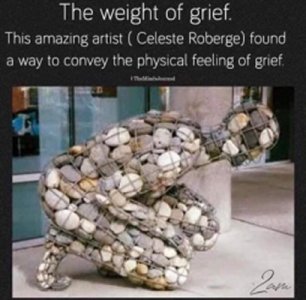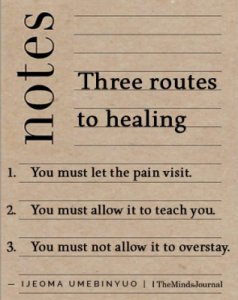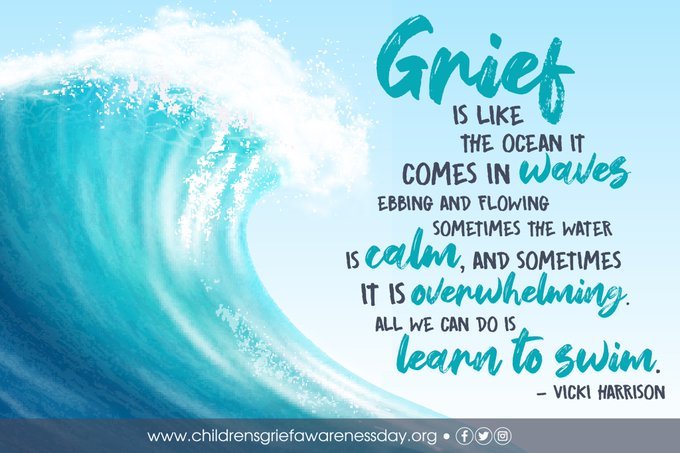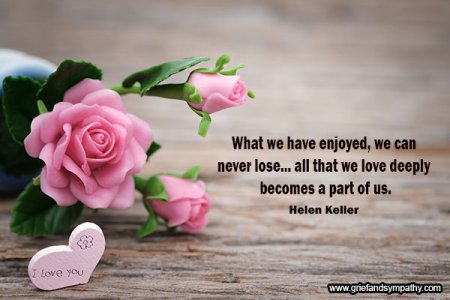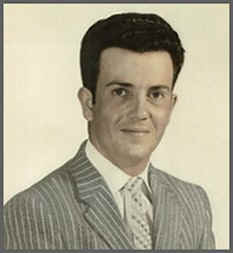
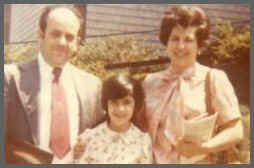
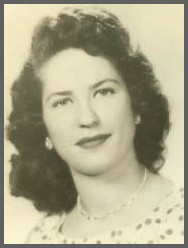
Personal Observations On Grief and Loss
Grief is a very complicated and seldom understood topic. One thing is for certain -- it is a suffocating, emotional tornado that leaves a person feeling completely out of control and bewildered, no matter how much experience or faith one possesses. One of the ways I describe it is as being on a runaway rollercoaster that just keeps going and going. Just when I think it's slowing down and will come to a stop, it races on again and I have no idea how long the ride will be.
I would like to share what I have learned about grief, along with my personal feelings, so that it may help soothe you or perhaps give you new insight if you or someone you love is suffering the pain of the loss of a loved one.
My mother died suddenly in May 1978 at the age of 40 of an aneurysm/blood clot when I was 11 years old. I never had the chance to say goodbye because she died in a split second while watching television with my dad after I went to bed one night. My father died in December 1999 at the age of 67 after a two-week hospital stay and emergency open heart surgery. He was expected to make a full recovery but suddenly took a turn for the worst. I feel some solace in the fact that my stepmom and I were with him those last moments and he knew we were there. It brings me comfort to realize that neither one of my parents had to die alone.
My mother Rose was a nurturing, vivacious woman admired by many, a shining example of unselfishness, compassion, and moral character. She had a way of lighting up a room with her magnetic qualities and beauty. Her eyes danced when she smiled, and she laughed often. Mom always made people feel special, and she loved deeply. She was very dedicated to God and her family. She risked her life to bring a baby into the world -- I am her only child.
My father Tony was my hero. He has always been a model father, and especially after mom passed away we grew closer. Between the time after momís death and his remarriage, it was just me and him. He became both mother and father, and took such good care of me in that difficult role of single parent. He was a man of character, inner strength, integrity, and courage. His wisdom and support have been my anchors in life. He was also known for his unique sense of humor, joy of life, and a strong devotion to God and his family.
I find myself struggling to fight the tendency to dwell on the hollow pain of being an orphan in my early 30's. Having lost the connection with the people who brought me into this world, I feel a pervading sense of loneliness despite a generous supply of love in my life from my marvelous husband, close relatives, a strong bond with God, and deep friendships.
Something for which I was totally unprepared was that the loss of my dad re-opened the wounds from losing mom. In other words, because I did not properly grieve my mom's death in childhood, now it is hitting me with full force ... the monster has been let out of the box. The full impact wasn't felt until about a month or so after dad's death because as I've been told often, I had numbed my feelings and tried not to feel the pain. Well, it finds a way to burst onto the scene and take you completely by surprise. So now I am learning, through the help of several avenues I'll mention later, how to face the pain and stop running. A few weeks after my dad passed away, I caught an episode of Oprah dealing with an unrelated topic and gleaned some interesting tidbits -- one woman was addicted to food and realized that there were underlying issues involved. She was hiding/running from pain. But she discovered a gem of truth ... in her words, "challenge the pain and the pain will lose its power." A psychologist or author on the show also said something wise: "You can't grow if you don't allow things to stretch you." Those insights have helped me realize I need to stop trying to bury my grief and face up to it, and I should be able to emerge a stronger person for it. Now that I'm on the path, I see it is truly the best course.
When my dad died unexpectedly, a friend who had lost her baby girl just hours after her birth told me that experiencing loss was like breaking a bone. In order for the bone to heal properly, it must be set, put into a cast, and cared for. Otherwise weíll be crippled from then on. She said grief work is hard work, but very necessary. That focused effort to heal is essential. What she said is so very true and requires taking care of yourself. Expect that youíll be capable of doing less for now. Staying close to God in prayer and relying on his strength, getting in touch with and expressing your feelings, and working hard at healing are all vital ingredients. I found a way to get in touch with my feelings was to write. It helped me pull everything up and out even though I wanted to bury the pain. When my mom died suddenly, I shoved all the pain inside -- but as an adult I came to learn how unhealthy that strategy is. When my dad died I was determined to learn a better strategy. Writing was one way to let the pain visit and let it teach me but not allow it to overstay. Here are some compositions: Grief Defined | The Bare Tree | Ode to The Eternal Father -- The Deep
Though each person's grief is as unique as an individual fingerprint, experts have discovered some common threads in the grief process. These stages do not follow any set pattern and can occur randomly and out of sequence, but they are part of the journey and must be allowed to surface:
Shock and numbness
disbelief
disorientation
anger
guilt
powerlessness
loss of the desire to live
envy of those who have not suffered this type of loss
The phases described above commonly peak on the anniversary date of the death and also on significant days in the relationship. Experts say that grief work usually dominates the life of the mourner for 18 months to two years. Of course, a variety of factors influence the intensity and duration of grief, such as the nature of the relationship, sense of closure, circumstances of the death, and so on. Mourning comes in waves. In my own case, the wounds are still all too fresh from my dad's death. And though decades have passed since mom died, I still break down into tears when certain things trigger a longing for my mother. Grief remains just below the surface, and emerges sometimes without warning.
Some notes on the stages I experienced with the loss of my mother:
I carried around a lot of abnormal guilt during childhood because the night before mom passed away, we got into an argument. Additionally, I remember when my dad and I got into the car to leave the hospital after getting the horrid news, I sobbed the words "And I was so mean to her." Much later I realized that I wasnít really mean, I was just a dumb 11-yr. old kid who had typical conflicts with my parents. I feel guilty, too, that the poor woman had to literally chase me around the house with the belt when I deserved a spanking -- and she had serious heart trouble.
While growing up, I felt tremendous jealousy over the fact that other kids had their moms. These feelings of envy still remain, especially as I have moved through adulthood and wish my mother could have been there to share important milestones in my life, such as my wedding and my significant accomplishments. I now also envy those who have both parents and I feel great frustration when people complain about their parent(s). Inside I'm thinking "Hey, you should be glad you HAVE your parent(s). Life is too short -- don't waste this precious time you have because someday it will be gone."
As a child I subconsciously expected that when I walked in the door from school I would see mom sitting in her favorite chair. I guess somehow I hoped all of this was just some horrible nightmare and that it would be over. But as the months passed, reality sunk in with a sickening thud and I knew she was not coming back. It was a nightmare, alright -- except I was living it, fully awake.
I also felt anger at the injustice of losing such a wonderful human being, the woman who brought me into the world at the risk of her own life and who I naturally expected to share my entire life with Ė in effect, I feel cheated. I was not angry at her because I know it wasnít her fault Ö she didnít want to die and leave us. Anger at the injustice also surfaced when my dad died. It's not fair, I really needed him and he still had many good years left. My anger is not directed toward God, though I understand why those feelings are common. I do not blame or question God regarding this tragedy ... I know it isnít His doing either. But I have learned to cope with this injustice and constantly try to remind myself that someday it will be remedied and I will be able to see my parents again.
I feel that this loss has affected my spirituality in a positive way. I have learned to rely on God for strength and to wait on Him to remedy the situation, drawing intense fortitude from prayer and Bible study. My faith has grown stronger. The intimate friendship with my Creator moves me to try my best to live up to the dedication I made so many years ago to serve Him for the rest of my days, which gives my life a true sense of purpose. Also, because of what I have learned from the Bible, I have a strong hope for the future Ė to be reunited with my mother and father and enjoy the kind of life God originally intended for mankind Ö a peaceful, blissful existence on a paradise earth. Sharing this hope and conviction with others and showing them how to draw closer to their Creator has helped me to grow spiritually and keeps my hope alive and real. The connection I have developed with God soothes my aching heart in a way that is beyond description.
Something that needs a great deal of attention is that children grieve differently than adults. They do not have the coping skills of grown-ups, many times they donít even have a complete grasp on the concept of death. In order for them to develop into well-adjusted adults, they must be encouraged to grieve. Those closest to the child need to keep the lines of communication open and let him or her know that itís OK to cry, itís OK to be angry, etc. The child has to feel like he or she can be expressive, and adults should kindly help them adjust to the loss and the changing circumstances. Please do not assume everything is fine just because the young person seems to be handling it. In many cases, quickly getting back to "normal" means the child is suppressing emotion, which is damaging. If the loved oneís death was sudden and unexpected, he or she will need answers and perhaps even spiritual guidance to understand that God is not to blame. Losing a parent during childhood alters the child's life in ways that reach far into adulthood. To see how it has shaped me into the person I am today, click here to read "Deep Within".
Many grief-stricken people wonder if they should start taking antidepressant drugs or tranquilizers. Though the decision is yours, the general consensus among experts is that these will cause more problems than they will solve. They stifle and therefore delay the natural progression of grief, preventing the person from living through the feelings that must be dealt with in order for healthy healing to take place. While it's true the expression of the strong emotions connected with grief can be extremely frightening, these drugs are merely a band-aid and could actually do more harm than good. They are fraught with side effects.
I learned that it's important to allow yourself to grieve, donít be afraid to release your feelings. Though it seems too painful to allow them an outlet, itís crucial. Especially to let yourself cry. Crying actually reduces levels of stress hormones, and toxic chemicals and enzymes produced by the event. God made tears to have healing properties, they are worth every drop. I finally learned that healing can only come from allowing grief to take its natural course. Healing doesnít mean that you forget your loved one (which is impossible anyway), it just means you can find a way to manage the pain and cope with the loss though a part of you has died.
I recently discovered a weird and cute kids song with an underlying application/lesson that can be applied to dealing with grief: ďGoing on a Bear Hunt". The chorus really captures the essence of how to handle the trauma of losing someone we love Ö we canít go around it. We canít go over it. We canít go under it. We have to go through it. Wow, that perfectly describes how we have to let ourselves go through grief to find healing and peace.There is no doubt that grief must be given a healthy outlet. The intense feelings which surface cannot be bottled up or masked because this will wreak havoc on the sufferer's emotional and physical health. This is something it has taken me a long time to realize. Here are some things that have been helping me in this regard:
talking to sympathetic people -- find a person or persons who will let you talk things out. A kind soul who will open their ears and their heart to you. Take advantage of any offers to cry on someone's shoulder, it is very soothing. You may even want to let him or her know that they don't necessarily have to say anything, just being there is enough.
writing/journeling -- this is especially helpful because not only does it allow you to pull those emotions out, but having a written record gives you the ability to see where you've been and how far you've progressed.
support groups and/or internet forums -- here you can meet others who share your pain and completely understand the turmoil in your life. You can tell your story over and over again, which is an important part of the healing process. I have especially enjoyed online forums because I can read the experiences of others and share my story and questions if I want to participate. Having people who can relate is a valuable tool for the grief journey. The best ones I recommend are professionally monitored and moderated to stay on topic and appropriate. Try these to get started: https://www.griefhealingdiscussiongroups.com/forum and http://www.webhealing.com/honor.html (of course, as always, please use discernment to maintain your privacy such as not using your full name as your display name and not mentioning your city or contact information.)
prayer -- don't underestimate this powerful avenue. Even if you have no idea what to say, try it -- you will notice a difference. Ask God for strength, peace, and comfort.
screaming -- I know it sounds ridiculous, but screaming is quite a release. One of my best friends came up with the idea to take me to the beach one night a few weeks after my dad died so I could just scream my brains out. I'm glad I quit fighting the idea and took her up on it, because it had a liberating effect! At first I just belted out a long yell, then before I knew it I was screaming sentences at the top of my lungs out over the ocean. If you don't live near the beach or can't bring yourself to do that, screaming into a bottle or pillow works great too. Oh, and while driving alone in your car (make sure you're not at a stoplight, though, so other drivers don't think you're a nut case).
Grief is a wild ride. Like a popular quote says, grief is like the ocean Ė ďit comes in waves, ebbing and flowing. Sometimes the water is calm and sometimes itís overwhelming. All we can do is learn to swim.Ē In essence, I would like to say to others who are grieving that you WILL make it through this. Though your heart will always ache for your loved one, life will once again become an enjoyable experience. The way you choose to cope with your tragic circumstances is directly related to how soon and how deeply you heal. Let people help you, be sure to take time for yourself, and most importantly, donít push God away or anyone whom He sends to comfort you. He is the only One who can reverse the damage ... both now and in the future!
Please read these other two articles I have written entitled "Healing Tools that Have Transformed My Life" and "How You Can Find Comfort". Poetry and compositions on the topic of parent loss are here: https://insidersecrets.info/compositions.htm
© Copyright April 25, 2000 to present, by Deborah McGeorge, St. Augustine, Florida
Recommended resources:
Help For Those Who Grieve
When A Loved One Dies
When Someone You Love Dies
Emotional Freedom Technique (EFT)
The Sedona Method
Attacking Anxiety & Depression
Motherless Daughters
The Mourning Handbook
PMA Institute
